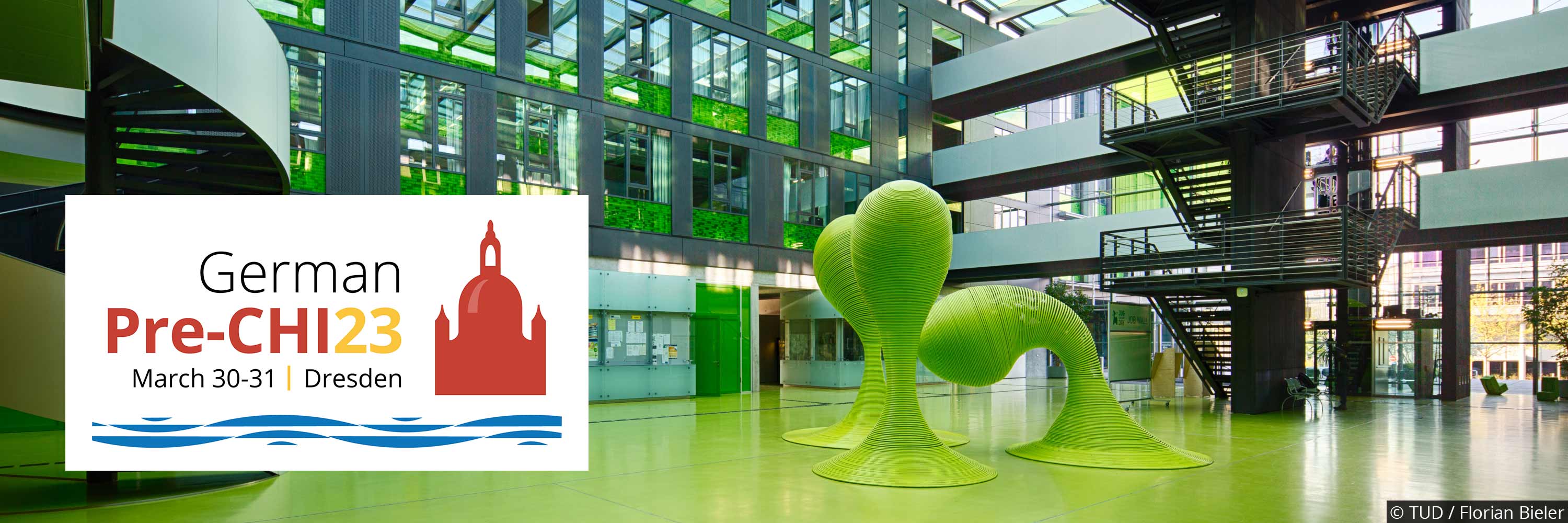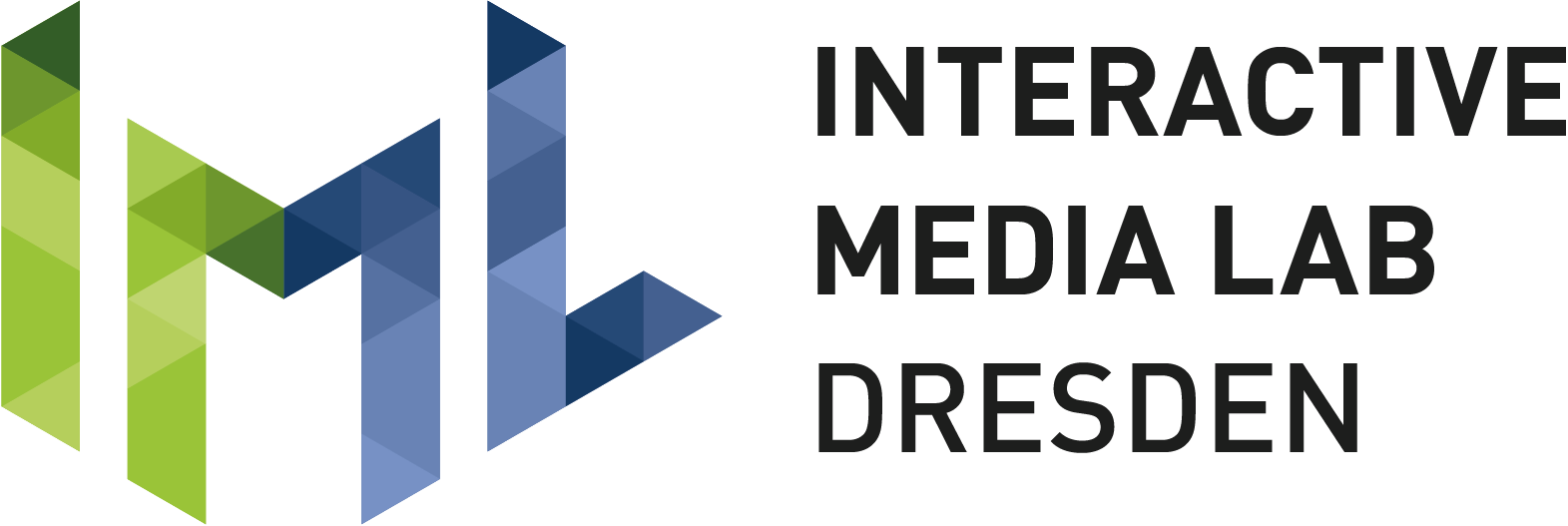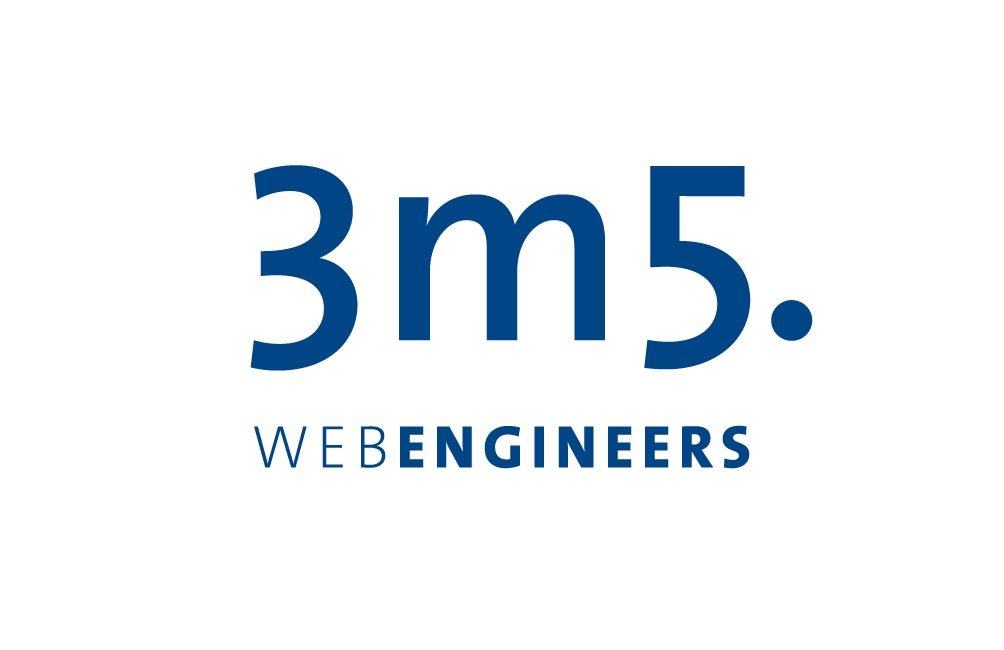
Following the tradition of bringing the German HCI community and friends together before going to CHI, the German Pre-CHI 2023 will be hosted in Dresden. The idea of the event is to provide an opportunity for researchers from Germany to present their accepted CHI 2023 papers and discuss them in a smaller circle. Additionally, it provides an excellent opportunity for younger researchers to get a taste of the quality of work presented at CHI and network with other peers, as well as senior researchers. Therefore, everyone from students to professors interested in HCI is welcome.
The event is taking place over two days and includes paper talks, poster & demo sessions, coffee breaks, lunch, and lots of informal discussions. We are planning to have several paper sessions, in which young researchers will present their paper talks. After each presentation, we will have a discussion session, which will include the “usual” CHI discussion, but also comments and suggestions on presentation style, slides, etc. in order to optimally prepare you for a presentation at CHI. There will also be an informal session where late-breaking works and demos can be presented and discussed.
Registration
The registration deadline was March 2nd 8th, 2023. For further registration possibilities, please get in touch with Rufat Rzayev.
In general, participation is free of charge. However, costs for traveling and accommodation are self-paid.
Venue
This years’ edition of the German Pre-CHI is organized as an onsite event. It will be located in the building Andreas-Pfitzmann-Bau (APB) at Technische Universität Dresden (Campus Navigator, Google Maps). The address is:
- TU Dresden – Fakultät Informatik
Nöthnitzer Straße 46
01187 Dresden
Accommodation
Dresden offers a large variety of hotels. Based on our experience regarding the reachability of the hotels themselves as well as the way to the faculty building, we recommend the following hotels:
Public Transport
We suggest to use public transport (DVB) to drive to the venue. You can either use
- Bus line 85 to the station Helmholtzstraße, which is directly in front of the faculty building; or
- Tram line 3 to the station Münchner Platz, then walk a short distance to the building in about 5 minutes.
Program
Schedule
Day 1: Thursday, March 30
| Time | Program |
|---|---|
| 08:45-09:30 | Registration & Setting up Poster and Demos |
| 09:30-09:50 | Welcome |
| 09:50-10:00 | Poster Madness |
| 10:00-11:00 | Session 1: Privacy and Authentication |
| 11:00-11:30 | Coffee break |
| 11:30-12:45 | Session 2: Smart Assistance and Smart Homes |
| 12:45-14:00 | Lunch |
| 14:00-15:30 | Session 3: Immersive Interaction & Analytics |
| 15:30-16:30 | Coffee break + Poster Session + Lab tours |
| 16:30-18:40 | Lab tours |
| 19:30 | Dinner (social event) |
Day 2: Friday, March 31
| Time | Program |
|---|---|
| 09:00-10:30 | Session 4: Understanding Human and Social Experience |
| 10:30-11:00 | Coffee break |
| 11:00-12:30 | Session 5: Haptics, AI & Robots |
| 12:30-12:45 | Closing |
| Lunch (self-paid) |
Paper Sessions
Session 1: Privacy and Authentication (Session Chair: Stefan Schneegass)
-
Understanding and Mitigating Technology-Facilitated Privacy Violations in the Physical World
Maximiliane Windl (LMU Munich, Munich Center for Machine Learning (MCML)), Verena Winterhalter (LMU Munich), Albrecht Schmidt (LMU Munich), Sven Mayer (LMU Munich)
-
Investigating Tangible Privacy-Preserving Mechanisms for Future Smart Homes
Maximiliane Windl (LMU Munich, Munich Center for Machine Learning (MCML)), Albrecht Schmidt (LMU Munich), Sebastian S. Feger (LMU Munich)
-
HotFoot: Foot-Based User Identification using Thermal Imaging
Alia Saad (University of Duisburg-Essen), Kian Izadi (LMU Munich), Anam Ahmad Khan (National University of Science and Technology), Pascal Knierim (University of the Bundeswehr Munich, Universität Innsbruck), Stefan Schneegass (University of Duisburg-Essen), Florian Alt (University of the Bundeswehr Munich), Yomna Abdelrahman (University of the Bundeswehr Munich, European Universities in Egypt)
Session 2: Smart Assistance and Smart Homes (Session Chair: Eva Hornecker)
-
Inhabiting Interconnected Spaces: How Users Shape and Appropriate their Smart Home Ecosystems
Mikołaj P. Woźniak (University of Oldenburg), Sarah Vöge (University of Oldenburg), Ronja Krüger (Carl von Ossietzky University of Oldenburg), Heiko Müller (University of Oldenburg), Marion Koelle (OFFIS – Institute for Information Technology), Susanne Boll (University of Oldenburg)
-
Marcel Ruoff (Karlsruhe Institute of Technology (KIT)), Brad A Myers (Carnegie Mellon University), Alexander Maedche (Karlsruhe Institute of Technology (KIT))
-
Sebastian Weiß (OFFIS – Institute for Information Technology), Wilko Heuten (OFFIS – Institute for Information Technology)
-
The Walking Talking Stick: Understanding Automated Note-Taking in Walking Meetings
Luke Haliburton (LMU Munich), Natalia Bartłomiejczyk (Lodz University of Technology), Albrecht Schmidt (LMU Munich), Paweł W. Woźniak (Chalmers University of Technology), Jasmin Niess (University of St. Gallen)
Session 3: Immersive Interaction & Analytics (Session Chair: Raimund Dachselt)
-
PEARL: Physical Environment based Augmented Reality Lenses for In-Situ Human Movement Analysis
Weizhou Luo (Technische Universität Dresden), Zhongyuan Yu (Technische Universität Dresden), Rufat Rzayev (Technische Universität Dresden), Marc Satkowski (Technische Universität Dresden), Stefan Gumhold (Technische Universität Dresden), Matthew McGinity (Technische Universität Dresden), Raimund Dachselt (Technische Universität Dresden)
-
AutoVis: Enabling Mixed-Immersive Analysis of Automotive User Interface Interaction Studies
Pascal Jansen (Ulm University), Julian Britten (Ulm University), Alexander Häusele (Ulm University), Thilo Segschneider (Ulm University), Mark Colley (Ulm University), Enrico Rukzio (University of Ulm)
-
Exploring Pseudo-Stiffness to Enrich the Haptic Experience in Virtual Reality
Yannick Weiss (LMU Munich), Steeven Villa (LMU Munich), Albrecht Schmidt (LMU Munich), Sven Mayer (LMU Munich), Florian Müller (LMU Munich)
-
Investigating the Effects of Individual Spatial Abilities on Virtual Reality Object Manipulation
Tobias Drey (Ulm University), Michael Montag (Magdeburg-Stendal University of Applied Science), Andrea Vogt (Ulm University), Nico Rixen (Ulm University), Tina Seufert (Ulm University), Steffi Zander (Magdeburg-Stendal University of Applied Science), Michael Rietzler (Ulm University), Enrico Rukzio (Ulm University)
-
Florian Müller (LMU Munich), Arantxa Ye (LMU Munich), Dominik Schön (TU Darmstadt), Julian Rasch (LMU Munich)
Session 4: Understanding Human and Social Experience (Session Chair: Rufat Rzayev)
-
Francesco Chiossi (LMU Munich), Luke Haliburton (LMU Munich), Changkun Ou (LMU Munich), Andreas Martin Butz (LMU Munich), Albrecht Schmidt (LMU Munich)
-
Maria Aufheimer (KU Leuven), Kathrin Gerling (KU Leuven), T.C. Nicholas Graham (Queen’s University), Mari Naaris (KU Leuven), Marco J. Konings (KU Leuven), Elegast Monbaliu (KU Leuven), Hans Hallez (KU Leuven), Els Ortibus (KU Leuven)
-
Understanding the Perception of Human Augmentation: A Mixed-Method Study
Steeven Villa (LMU Munich), Jasmin Niess (University of St. Gallen), Takuro Nakao (Keio University Graduate School of Media Design), Jonathan Lazar (University of Maryland), Albrecht Schmidt (LMU Munich), Tonja-Katrin Machulla (TU Chemnitz)
-
Going, Going, Gone: Exploring Intention Communication for Multi-User Locomotion in Virtual Reality
Julian Rasch (LMU Munich), Vladislav Dmitrievic Rusakov (LMU Munich), Martin Schmitz (Saarland University), Florian Müller (LMU Munich)
-
Let’s Face It: Influence of Facial Expressions on Social Presence in Collaborative Virtual Reality
Simon Kimmel (OFFIS – Institute for Information Technology), Frederike Jung (OFFIS – Institute for Information Technology), Andrii Matviienko (Technical University of Darmstadt), Wilko Heuten (OFFIS – Institute for Information Technology), Susanne Boll (University of Oldenburg)
Session 5: Haptics, AI & Robots (Session Chair: Stefan Gumhold)
-
Nihar Sabnis (Max Planck Institute for Informatics, Saarland Informatics Campus), Dennis Wittchen (Max Planck Institute for Informatics, Saarland Informatics Campus), Courtney N. Reed (Max Planck Institute for Informatics, Saarland Informatics Campus), Narjes Pourjafarian (Saarland University, Saarland Informatics Campus), Jürgen Steimle (Saarland University, Saarland Informatics Campus), Paul Strohmeier (Max Planck Institute for Informatics, Saarland Informatics Campus)
-
Nihar Sabnis (Max Planck Institute for Informatics, Saarland Informatics Campus), Dennis Wittchen (Max Planck Institute for Informatics, University of Applied Sciences), Gabriela Vega (Max Planck Institute for Informatics), Courtney N. Reed (Max Planck Institute for Informatics, Saarland Informatics Campus), Paul Strohmeier (Max Planck Institute for Informatics, Saarland Informatics Campus)
-
CrowdSurfer: Seamlessly Integrating Crowd-Feedback Tasks into Everyday Internet Surfing
Saskia Haug (Karlsruhe Insititute of Technology (KIT)), Ivo Benke (Karlsruhe Insititute of Technology (KIT)), Daniel Fischer (Karlsruhe Institute of Technology (KIT)), Alexander Maedche (Karlsruhe Institute of Technology (KIT))
-
TmoTA: Simple, Highly Responsive Tool for Multiple Object Tracking Annotation
Marzan Tasnim Oyshi (TU Dresden), Sebastian Vogt (Software and Multimedia Technology), Stefan Gumhold (TU Dresden)
-
How to Communicate Robot Motion Intent: A Scoping Review
Max Pascher (Westphalian University of Applied Sciences, University of Duisburg-Essen), Uwe Gruenefeld (University of Duisburg-Essen), Stefan Schneegass (University of Duisburg-Essen), Jens Gerken (Westphalian University of Applied Sciences)
Poster Session
-
Spatiality and Semantics – Towards Understanding Content Placement in Mixed Reality
Mats Ole Ellenberg (Technische Universität Dresden), Marc Satkowski (Technische Universität Dresden, Weizhou Luo (Technische Universität Dresden), Raimund Dachselt (Technische Universität Dresden)
-
Point Cloud Alignment through Mid-Air Gestures on a Stereoscopic Display
Katja Krug (Technische Universität Dresden), Marc Satkowski (Technische Universität Dresden), Reuben Docea (National Center for Tumor Diseases (NCT)), Tzu-Yu Ku (Technische Universität Dresden), Raimund Dachselt (Technische Universität Dresden)
-
Francesco Chiossi (LMU Munich), Changkun Ou (LMU Munich), Sven Mayer (LMU Munich)
-
Jan Leusmann (LMU Munich), Carl Oechsner (LMU Munich), Johanna Prinz (LMU Munich), Robin Welsch (Aalto University), Sven Mayer (LMU Munich)
-
Luca-Maxim Meinhardt (Institute of Media Informatics), Kristof Van Laerhoven (University of Siegen), David Dobbelstein (Carl Zeiss AG)
-
Up, Up and Away – Investigating Information Needs for Helicopter Pilots in future Urban Air Mobility
Luca-Maxim Meinhardt (Institute of Media Informatics), Mark Colley (Ulm University), Alexander Faßbender (Institute of Media Informatics), Michael Rietzler (Institute of Media Informatics), Enrico Rukzio (University of Ulm)
-
Exploring Gesture and Gaze Proxies to Communicate Instructor’s Nonverbal Cues in Lecture Videos
Tobias Wagner (Ulm University), Teresa Hirzle (University of Copenhagen), Anke Huckauf (Ulm University), Enrico Rukzio (University of Ulm)
-
Exploring Mixed Reality in General Aviation to Support Pilot Workload
Christopher Katins (HU Berlin), Sebastian S. Feger (LMU Munich), Thomas Kosch (HU Berlin)
-
(Workshop Submission) Developing a Multiple-EDT-Supervision Interface
Max Kullmann1, Daniel Pietschmann2, Benny Liebold2, Maximilian Eibl3, Lewis L. Chuang11 Humans and Technology, Chemnitz University of Technology, Germany
2 Institute for Media Research, Chemnitz University of Technology, Germany
3 Media Informatics, Chemnitz University of Technology, Germany
-
(Workshop Submission) Can Asynchronous Kinetic Cues of Physical Inputs Improve (Home) Automation?
Max Kullmann1, Jan Ehlers2, Eva Hornecker3, Lewis L. Chuang1
1 Humans and Technology, Chemnitz University of Technology, Germany
2 Usability, Faculty of Media, Bauhaus-Universität Weimar, Germany
3 Human-Computer Interaction, Faculty of Media, Bauhaus-Universität Weimar, Germany
Lab Tours
The Lab Tours will allow all participants to see selected demonstrations of five different labs present at our faculty.
- Interactive Media Lab (IML)
- Immersive Experience Lab (IX)
- Chair of Computer Graphics and Visualization (CGV)
- Chair of Media Design (MG)
- Chair of Human-Computer Interaction (MCI)
The Lab Tours will consist of four groups of roughly 15 participants. Each group will be guided by one of the IML team members. You can see the planned schedule for each group below:
| Time | IML (APB 2042) | IML (APB 2044) | MG (APB 2058) | CGV (APB 2079) | MCI (APB 1096) |
|---|---|---|---|---|---|
| 16:30-16:40 | Group 1 | ||||
| 16:40-16:50 | Group 1 | Group 4 | Group 3 | Group 2 | |
| 16:50-17:00 | Group 1 | Group 4 | Group 3 | Group 2 | |
| 17:00-17:10 | Group 2 | Group 1 | Group 4 | Group 3 | |
| 17:10-17:20 | Group 2 | Group 1 | Group 4 | Group 3 | |
| 17:20-17:30 | Group 2 | Group 1 | Group 4 | Group 3 | |
| 17:30-17:40 | Group 3 | Group 2 | Group 1 | Group 4 | |
| 17:40-17:50 | Group 3 | Group 2 | Group 1 | Group 4 | |
| 17:50-18:00 | Group 3 | Group 2 | Group 1 | Group 4 | |
| 18:00-18:10 | Group 4 | Group 3 | Group 2 | Group 1 | |
| 18:10-18:20 | Group 4 | Group 3 | Group 2 | Group 1 | |
| 18:20-18:30 | Group 4 | Group 3 | Group 2 | Group 1 | |
| 18:30-18:40 | Group 4 | Group 3 | Group 2 |
Additionally, the demonstration of the IX Lab will take place at the same time as the poster presentations. Only a smaller group of people (ca. 5) can participate for ca. 10min. The organizer of this demo will guide the smaller groups to their lab and back to the main event location.
Dinner (social event)
There will be a joint dinner on Thursday evening, thanks to our sponsor 3m5. Media GmbH.
- Where? Sophienkeller Dresden (Taschenberg 3, 01067 Dresden; GoogleMaps)
- When? 19:30
- How to get there? We recommend to use public transport (DVB). Option 1: Take Tram line 3 from the station Münchner Platz to the station Pirnaischer Platz and then walk to the Sophienkeller (GoogleMaps). Option 2: You can also take Tram line 8 from the station Nürnberger Platz to the station Postplatz and then walk a short distance to the Sophienkeller (GoogleMaps).
Organizers
- General Chair: Raimund Dachselt
- Registration & Program: Rufat Rzayev
- Local Arrangements: Ramona Behling and Weizhou Luo
- Posters & Lab Tours: Katja Krug and Marc Satkowski
- Technical Assistance: Udo Wähner
- Logo, Print & Signage: Konstantin Klamka
- Social Media: Wolfgang Büschel
- Website: Ricardo Langner
- Social Event: Mats Ole Ellenberg and Julián Méndez




